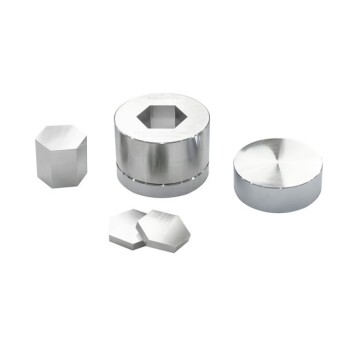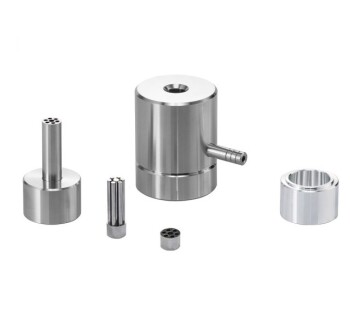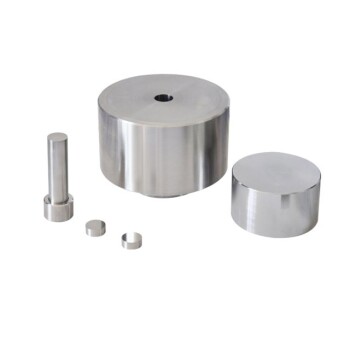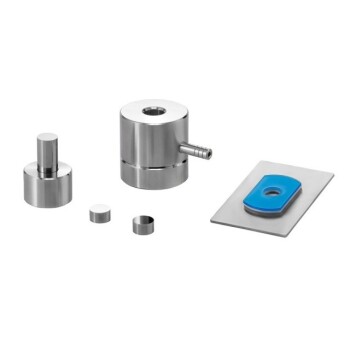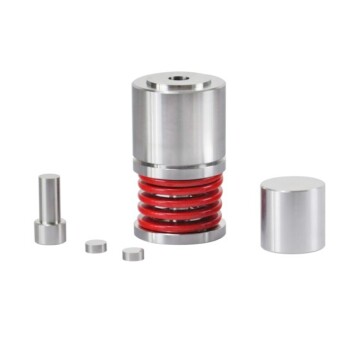At its core, a heated lab press transforms raw polymer material, such as pellets or powder, into precisely engineered thin films. It achieves this by applying highly controlled heat to melt the polymer and immense, uniform pressure to shape it, resulting in a film with consistent thickness, density, and specific physical properties.
The true value of a heated press is not merely flattening material, but its ability to precisely control a polymer's final physical state. This process dictates the material's crystallinity, density, and uniformity, enabling the creation of standardized, repeatable samples essential for analytical testing, mechanical validation, and materials research.

The Fundamental Process: From Polymer to Film
A heated press operates on a simple yet powerful principle. The combination of thermal and mechanical energy reconfigures the polymer's molecular structure into a new, desired form.
The Role of Heat and Pressure
Heat is applied through platens to bring the polymer above its melting or glass transition temperature, allowing it to flow. Simultaneously, the press applies a specific, controlled force, compressing the molten material and forcing it to fill the shape of a mold or conform between two flat plates.
Achieving Uniform Thickness and Density
The parallel, flat surfaces of the press platens ensure that pressure is distributed evenly across the material. This uniform force is critical for eliminating voids or air pockets and producing a film with consistent thickness and density, which are prerequisites for accurate testing.
Controlling Material Properties
The process does more than just shape the material. The specific temperature, pressure, and especially the cooling rate directly influence the polymer's microstructure, such as its degree of crystallinity. Slower cooling generally allows for more ordered crystalline structures to form, which can significantly alter the material's mechanical strength and optical clarity.
Key Applications of Press-Formed Films
The films produced by a heated press are not typically end-products themselves. Instead, they are highly controlled specimens created for evaluation and analysis.
Preparing Samples for Analytical Spectroscopy
For techniques like FTIR (Fourier Transform Infrared) spectroscopy, a thin, uniform film is required for the infrared beam to pass through. A heated press creates films with the ideal thickness and consistency needed for clear, repeatable transmission analysis. The same principle applies to preparing uniform pellets for XRF (X-ray Fluorescence) analysis.
Creating Specimens for Mechanical Testing
To reliably measure a polymer's properties, test specimens must be standardized. Heated presses are used to create films and plaques from materials like PE, PP, and ABS that meet international standards for testing tensile strength, flexural modulus, impact resistance, and color stability.
Accelerating Material Development
In research and development, a lab press is an invaluable tool. It allows researchers to quickly create test samples of new polymer formulations, composites, or even electrodes for batteries. By varying the press parameters, they can study how processing conditions affect the final material properties and performance.
Understanding the Trade-offs and Critical Parameters
While powerful, the technique requires careful control over several variables to achieve the desired outcome. Mismanagement of these parameters can lead to flawed samples.
The Importance of Temperature Uniformity
Inconsistent heating across the platens will cause parts of the polymer to melt or flow differently. This results in a film with uneven thickness, internal stresses, and inconsistent properties, rendering it useless for precise analytical or mechanical testing.
The Impact of Pressure and Dwell Time
Applying the correct pressure is crucial. Too little pressure may not fully compact the material, leaving voids. Too much can physically damage the polymer chains or squeeze too much material out of the mold. The dwell time—how long the material is held at temperature and pressure—must also be sufficient to ensure complete melting and flow.
Material Suitability
Compression molding in a heated press is primarily suited for thermoplastics, which can be repeatedly melted and reshaped. While some specialized applications exist for thermosets (which cure and set permanently), the technique is far more common for polymers like polyethylene (PE), polypropylene (PP), and polystyrene (PS).
Making the Right Choice for Your Goal
The optimal press settings are dictated entirely by your end goal.
- If your primary focus is analytical testing (e.g., FTIR, XRF): Prioritize precise control over film thickness and surface uniformity to ensure repeatable and accurate spectroscopic results.
- If your primary focus is mechanical property testing (e.g., tensile strength): Concentrate on creating void-free films with consistent density and a controlled cooling rate, as these directly influence mechanical performance.
- If your primary focus is material development and prototyping: Use the press to systematically explore how different processing parameters (temperature, pressure, cooling) affect the final properties of new polymer formulations.
Ultimately, mastering the heated lab press empowers you to dictate a polymer's final form and function with precision.
Summary Table:
| Aspect | Key Details |
|---|---|
| Process | Applies controlled heat and pressure to melt and shape polymers into thin films. |
| Key Parameters | Temperature, pressure, dwell time, and cooling rate influence material properties. |
| Applications | Sample prep for FTIR/XRF spectroscopy, mechanical testing, and material R&D. |
| Material Suitability | Best for thermoplastics like PE, PP, PS; limited use for thermosets. |
| Benefits | Ensures uniform thickness, density, and repeatable results for accurate analysis. |
Ready to enhance your laboratory's capabilities with precision polymer processing? KINTEK specializes in high-quality lab press machines, including automatic lab presses, isostatic presses, and heated lab presses, designed to meet the rigorous demands of laboratories. Our equipment delivers precise temperature and pressure control, ensuring uniform film preparation for analytical testing, mechanical validation, and material development. Experience improved efficiency, repeatable results, and accelerated research outcomes. Contact us today to discuss how our solutions can support your specific needs and drive innovation in your projects!
Visual Guide

Related Products
- Automatic High Temperature Heated Hydraulic Press Machine with Heated Plates for Lab
- Lab Heat Press Special Mold
- Lab Polygon Press Mold
- Laboratory Manual Heated Hydraulic Press Machine with Hot Plates
- Automatic Heated Hydraulic Press Machine with Hot Plates for Laboratory
People Also Ask
- What role does a heated hydraulic press play in powder compaction? Achieve Precise Material Control for Labs
- What is a heated hydraulic press and what are its main components? Discover Its Power for Material Processing
- How are heated hydraulic presses applied in the electronics and energy sectors? Unlock Precision Manufacturing for High-Tech Components
- Why is a heated hydraulic press essential for Cold Sintering Process (CSP)? Synchronize Pressure & Heat for Low-Temp Densification
- Why is a hydraulic heat press critical in research and industry? Unlock Precision for Superior Results


